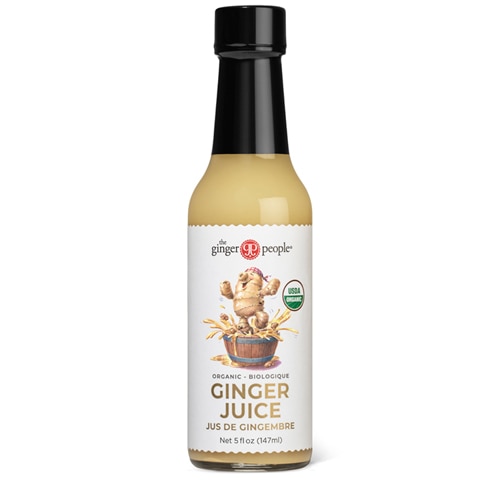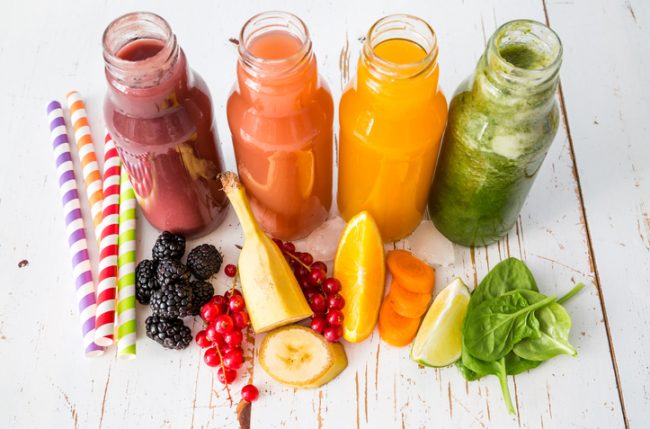Juice has been getting some bad press lately. For instance, Time.com published a story in January 2018 with his headline: “The Case Against Juice Is Stronger Than Ever.”
But does juice deserve to be squeezed so hard? The answer lies, in part, on whether you’re talking about apples and oranges or kale and spinach. In other words, how much sugar does the juice have?
Erica Larson, an integrative nutritionist and holistic health coach, summarizes the liquid form of fruits and vegetables this way: “Juice is a great way to get additional vitamins and minerals your body might be missing, but juice can also give you a sugar rush and offer minimal fiber.”
Here, we present four pros and four cons about juice.
Pros
1. Many vitamins and minerals
As Larson mentions, juice can be one way to add vitamins and minerals that your body is lacking.
Christina Jordan, a master nutritionist, notes that one glass of grapefruit or orange juice can supply a day’s worth of vitamin C. Depending on the type of juice, other valuable contents include vitamins — such as A, B, D and E — along with potassium and calcium.
“When fresh fruit is limited, a glass of organic juice is better than no fruit at all,” Jordan says.
- Convenience
Certified nutritionist Mindy Lu says juice can make a nice grab-and-go snack.
“Juice is an easy way to consume fruit if you are too rushed to eat an orange or apple,” Jordan says.
3. Quick absorption of nutrients
Since juice is stripped of fiber, the body can absorb the nutrients of fruits and vegetables pretty rapidly, according to Lisa Davis, chief nutrition officer at Terra’s Kitchen, a meal-kit company. In addition, she says, you can take in larger quantities of fruits and vegetables because juices are highly concentrated.
4. Anti-inflammatory properties
In the fight against chronic inflammation, JustJuice.org says juicing is “one of the smartest things you can use your juicer for. After all, inflammation is at the root of so many diseases that many of us struggle with every single day.”
The website’s suggestions for anti-inflammatory juicing include:
- Dark, leafy greens (like kale and spinach)
- Broccoli
- Carrots
- Red peppers
- Bitter melon
- Tomatoes
- Beets
- Blueberries
- Tart cherries
- Pineapple
While juice can help keep chronic inflammation in check, Becky Kerkenbush, a registered dietitian at Watertown Regional Medical Center in Wisconsin urges people to avoid juice cleanses or detox diets, as they’re low in calories, fiber and healthy fats, and they don’t lead to sustainable weight loss.
“Our body cleanses itself,” Kerkenbush says.
Cons
1. Too much sugar
The high sugar content represents perhaps the biggest drawback of most fruit juices, particularly those that aren’t organic or freshly squeezed.
Registered dietitian nutritionist Jennifer Glockner, creator of the Smartee Plate series of nutrition e-books for children, notes that dietary guidelines recommend limiting added sugars to 10 percent of daily calories. Juices that aren’t 100 percent juice often contain added sugars like high fructose corn syrup.
A side-by-side comparison shows how sugary 12 ounces of apple juice and 12 ounces of Coke are. A 12-ounce serving of apple juice packs 39 grams, or 9.8 teaspoons, of sugar. The same serving size of Coke delivers 40 grams, or 10 teaspoons, of sugar.
Although some other fruit juices (along with vegetable juices) are not as sugary as apple juice is, nutritionists recommend drinking only a moderate amount per day. And if you have diabetes or are trying to lose weight, you should skip fruit juice entirely, Jordan says.
To satisfy your juice fix, Davis suggests drinking green juices made with nutrient-dense vegetables and without fruit mixed in.
2. Too many calories
Largely because of the sugar, many fruit juices are loaded with calories. For instance, a 12-ounce serving of apple juice adds up to 165 calories, compared with 140 calories for a 12-ounce serving of Coke.
“Most people don’t realize this, but many typical juices, such as orange and grape juices, can contain more calories than a regular soda,” Jordan says. “Drinking too much juice will pack on the pounds for both adults and children.”
3. Lack of fiber
Whole fruits and vegetables generally are chock-full of fiber, whereas juices made from those fruits and vegetables tend not to be as rich in fiber. Fiber provides an array of health benefits and helps you feel full.
“It is always best to consume the whole fruit or veggie instead of the juice,” Glockner says. “If you want to drink some juice, add a splash to water or sparkling water. Try creating your own drink by adding fresh fruits or veggies with herbs to water or sparkling wa




